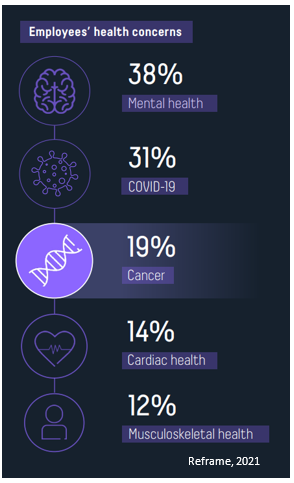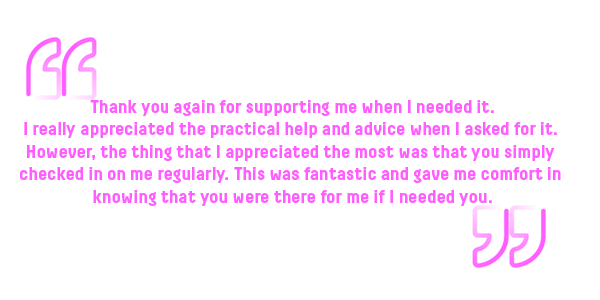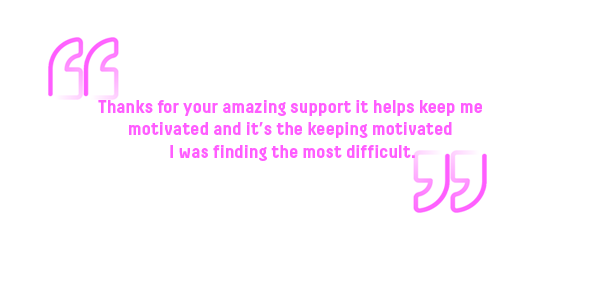Mental health and wellbeing challenges can affect anyone and everyone, particularly those who have been diagnosed with cancer.
One in three people with cancer will experience a mental health problem such as depression or anxiety disorders before, during or after treatment. The majority of these problems arise towards the end of cancer treatment, when there is little or no emotional support.
Finding a way to cope with these emotions can be really hard, especially accessing and identifying what's best for an individual. Some of your employees will be faced with cancer. If not directly, through their partner, a parent or even their child. With the right support, many of our clients choose to work through their journey minimising time away from work. As a business, you want to do the best for your people, but you might not always have the resources or expertise to help in the way you’d like.
We know from our research that employees often don’t want to talk to their employers about these stressful situations at home as they believe it will impact negatively on them. However, with the focus on employee benefits being ever more important post-covid, and the tools that employers need to draw upon in-order-to maintain and support their teams and colleagues, the need for supporting the more negative life experiences in the workplace is increasingly important. Employees tell us in our research that just knowing that their employer is providing support to those experiencing cancer and their families is immensely reassuring and makes a big difference to their perception of the duty of care their employer has for them. Looking at providing support for areas such as fertility issues, menopause, cancer and cardiac issues are becoming an ever-heightened agenda item for employers to find a way to support.

Given the growing cancer backlog causing delayed diagnosis and increased pressure on the NHS, it’s a concern that a fifth of companies we surveyed, with more than 5,000 employees, don’t see a need for detecting critical illnesses such as cancer earlier, or as a priority for their benefits package.
Cancer is ranked third behind COVID-19 and mental health in employees’ health concerns: 19% of our respondents are concerned about cancer; more than cardiac health (14%) and musculoskeletal health (12%). Mental health comes top in our research for employee health worries at 37%.
We recommend that when you have a colleague who has been diagnosed with cancer, allowing space for feelings to be expressed, and allowing someone to talk about their emotions in a way that suits them is important, but this is often challenging for those team members or HR teams in knowing how to manage. Sometimes it’s a case of asking if they want to talk. If not, then allowing them to have the opportunity to, in a way they would prefer, or providing access to the support they need in the way that suits them. We have a number of resources that can help HR teams and colleagues to navigate these often sensitive and difficult conversations.
Employees may experience many different emotions, particularly after their cancer treatments and when they are discussing their return to work. Returning to work is a big step for many people’s recovery. It can bring back a sense of control that provides normality, financial stability, routine, and extended social contact.
Recovery can take time, so not pressuring someone into returning to work too soon is vital. Equally the idea of returning to work can be extremely stressful and might require a number of adaptions to their schedule, desk and their working environment.
Paula Coffey, Unum UK’s Director of Claims, Rehab and Medical Services, states how important it is to get that manager/employee relationship right to support an employee to return to work.
Paula says: “A vital part in a successful return to work is the line manager. To support your staff, you need to create a culture of openness and ensure you build a relationship with your team so, if they're struggling, they feel they can come to you for support.
“However, your competency as line manager is ultimately demonstrated by how well you know your team, which enables you to spot when they are struggling and having the courage to talk to them rather than the employee having to make the first move. Granted, today’s hybrid working model can make communication and connection with your staff more difficult. Managers therefore need to pay even more attention to signs a team member may be struggling. This is why building that open relationship and having regular formal and informal meetings/calls/interactions are essential.
“At Unum, we believe in the importance of early intervention, but this is only successful if you as a line manager can signpost to resources available and be a positive role model within your business."
Feeling like the situation is out of control is a common feeling for someone on their cancer journey, but there are ways to help reduce this feeling. A detailed return-to-work plan can allow the individual to feel involved and feel in control over their return. This can include discussing temporary or longer-term changes, reasonable adjustments, time for re-training, and even a phased return to work.
The employee who’s returning to work after cancer may have found the experience very difficult and uncertain. We can get an idea for what someone is feeling, but if the experience isn’t our own, we don’t own it. It is hard to truly know another person’s mind. Providing support to fit around their other benefits and helping guide at every stage can provide multiple positive outcomes for all parties involved.

As leaders in cancer support, we’re wholly invested in delivering better outcomes from cancer for people and business. We were founded in 2012 to provide holistic cancer support services for those diagnosed with cancer and their carers.
Our experienced team of case managers, cancer nurse specialists and mental health first aiders work alongside health providers to help people navigate their entire journey more easily and links people and their colleagues in to all the support mechanisms at their disposal, whether that is PMI, EAP support, local charities and services or having a safe and burden free place to talk to one of our team. We build relationships with our clients and tap into what it is they need and support them in all areas of their life. It is this that sets us apart and enables us to create a holistic and all-encompassing environment.

Our dedicated team coaches, connects and supports people on all the moments that matter.
